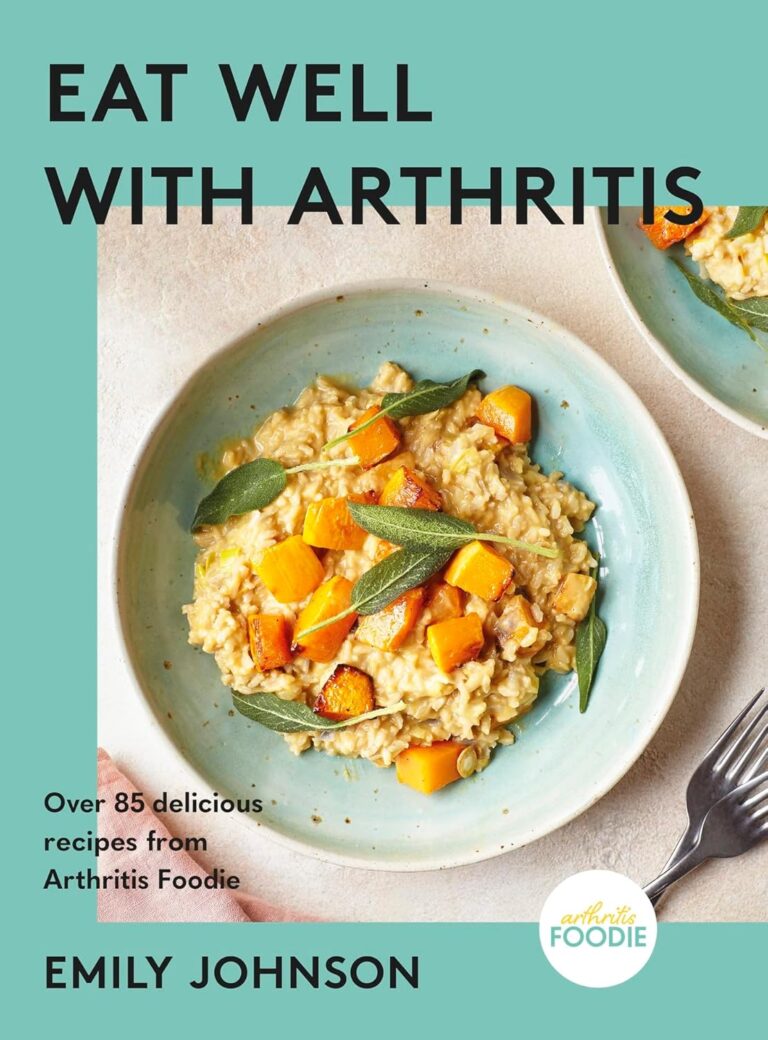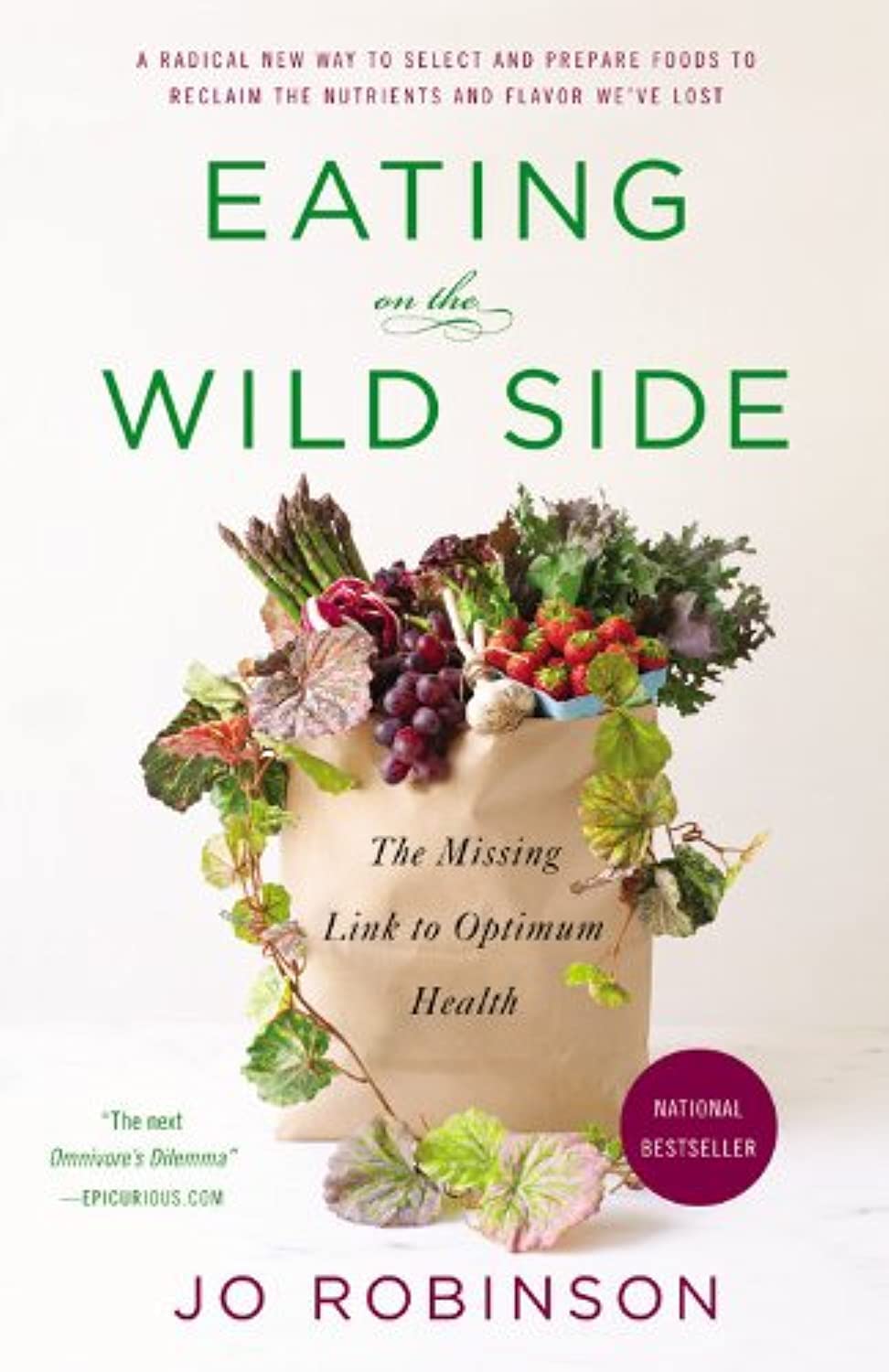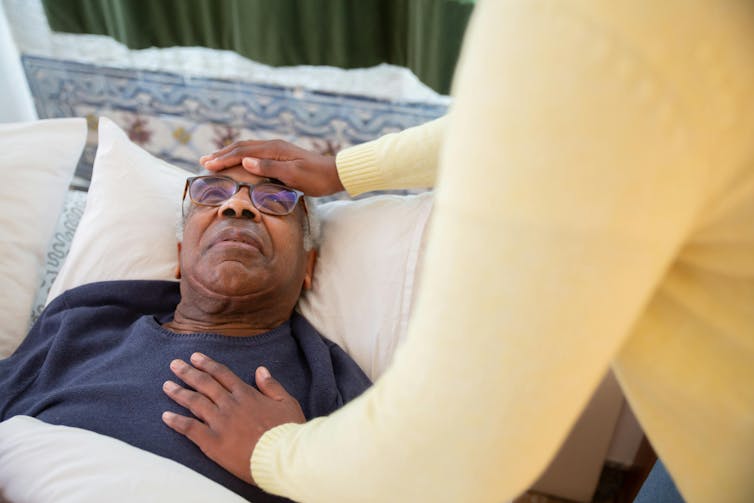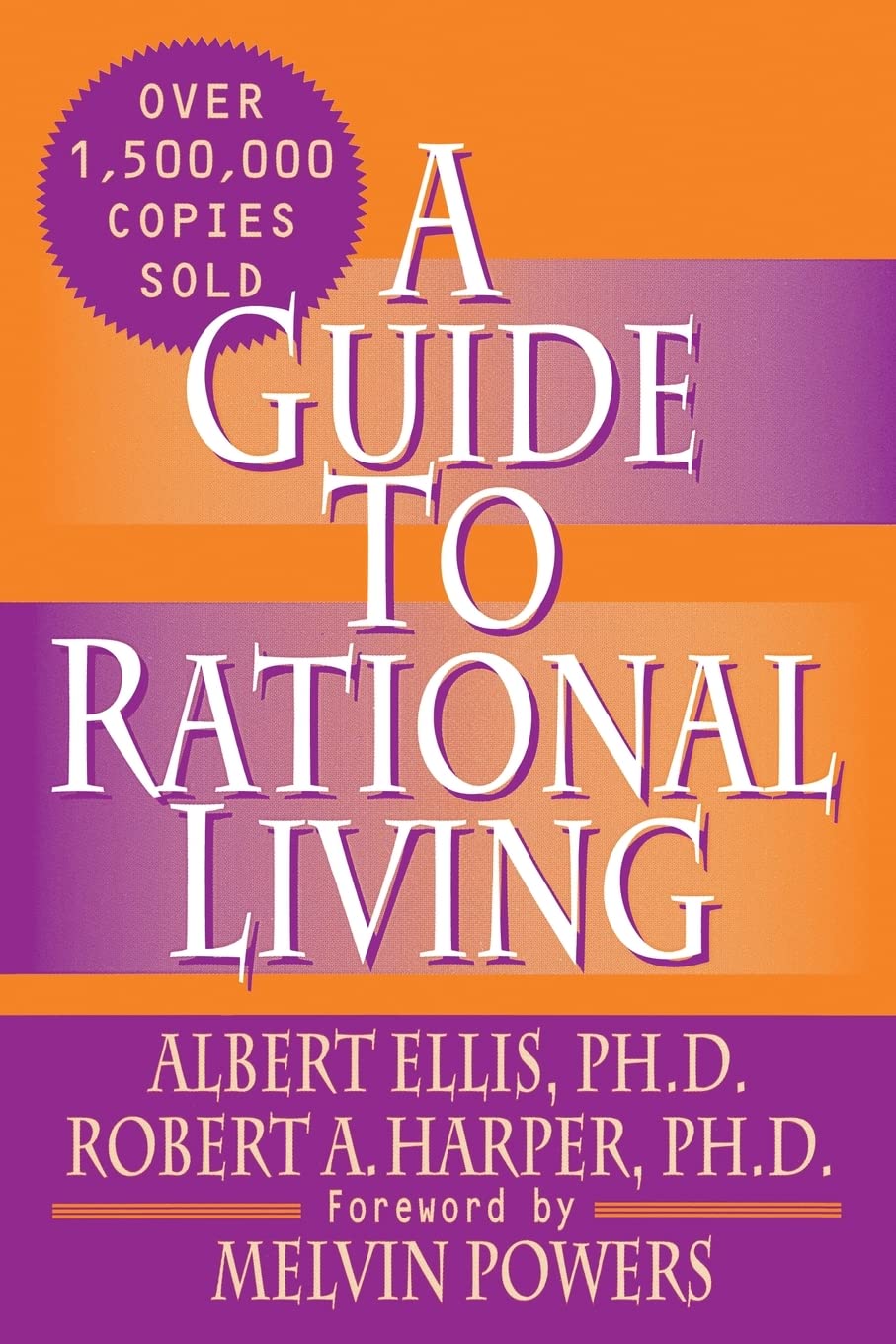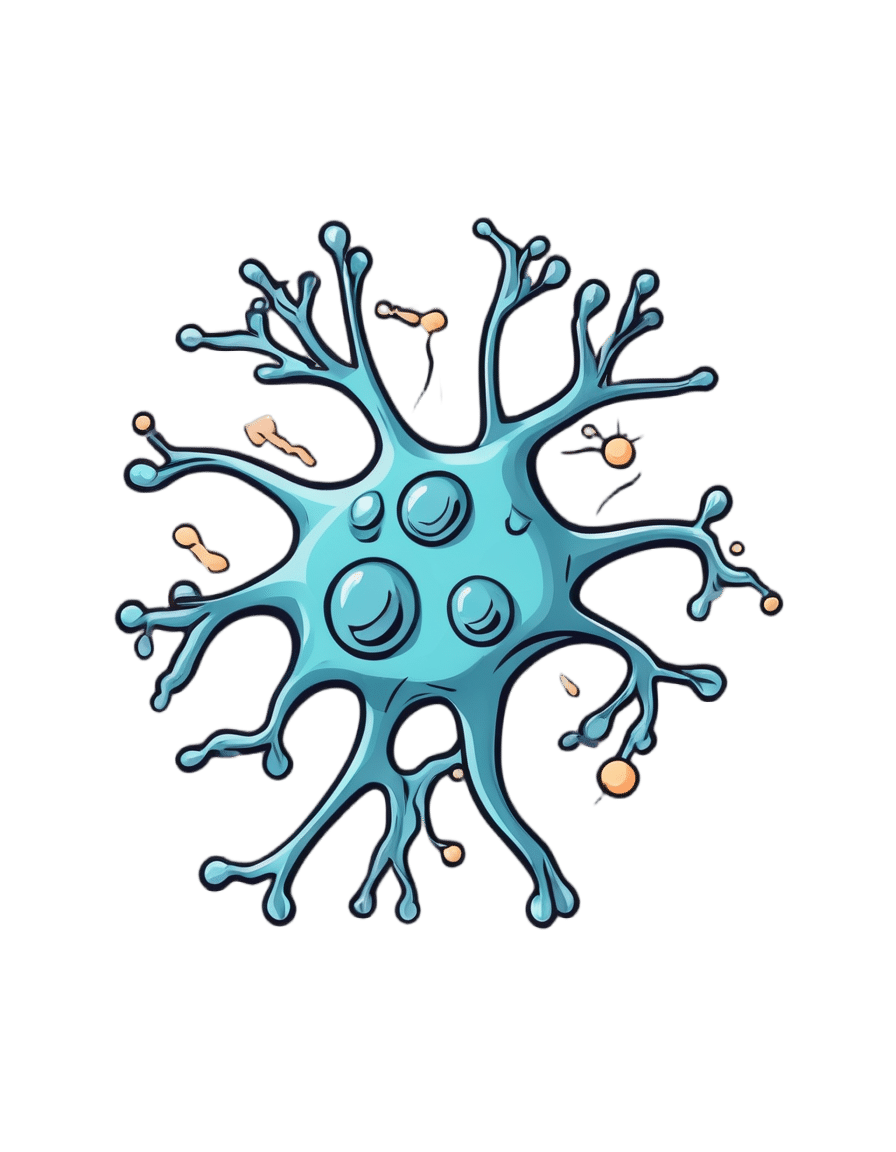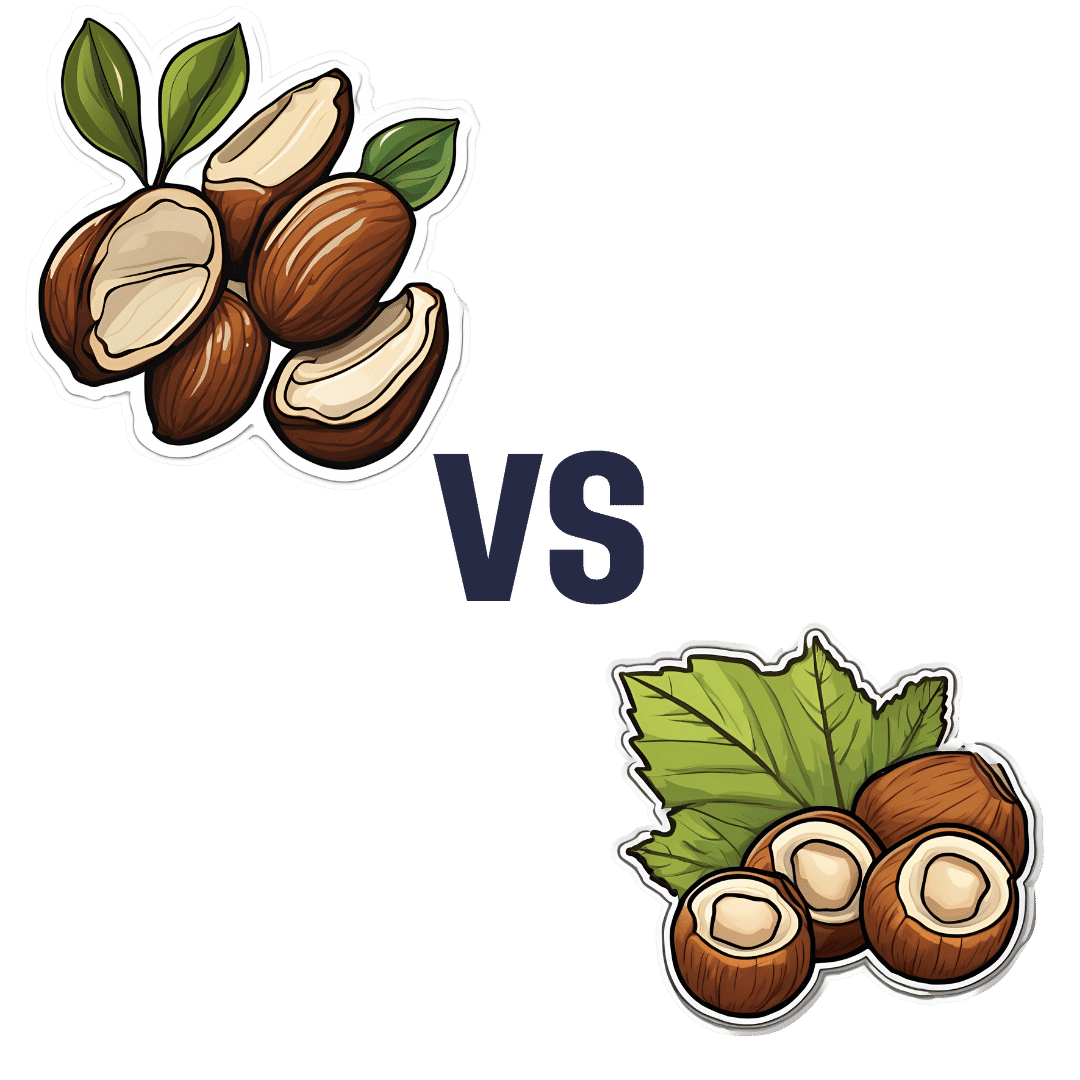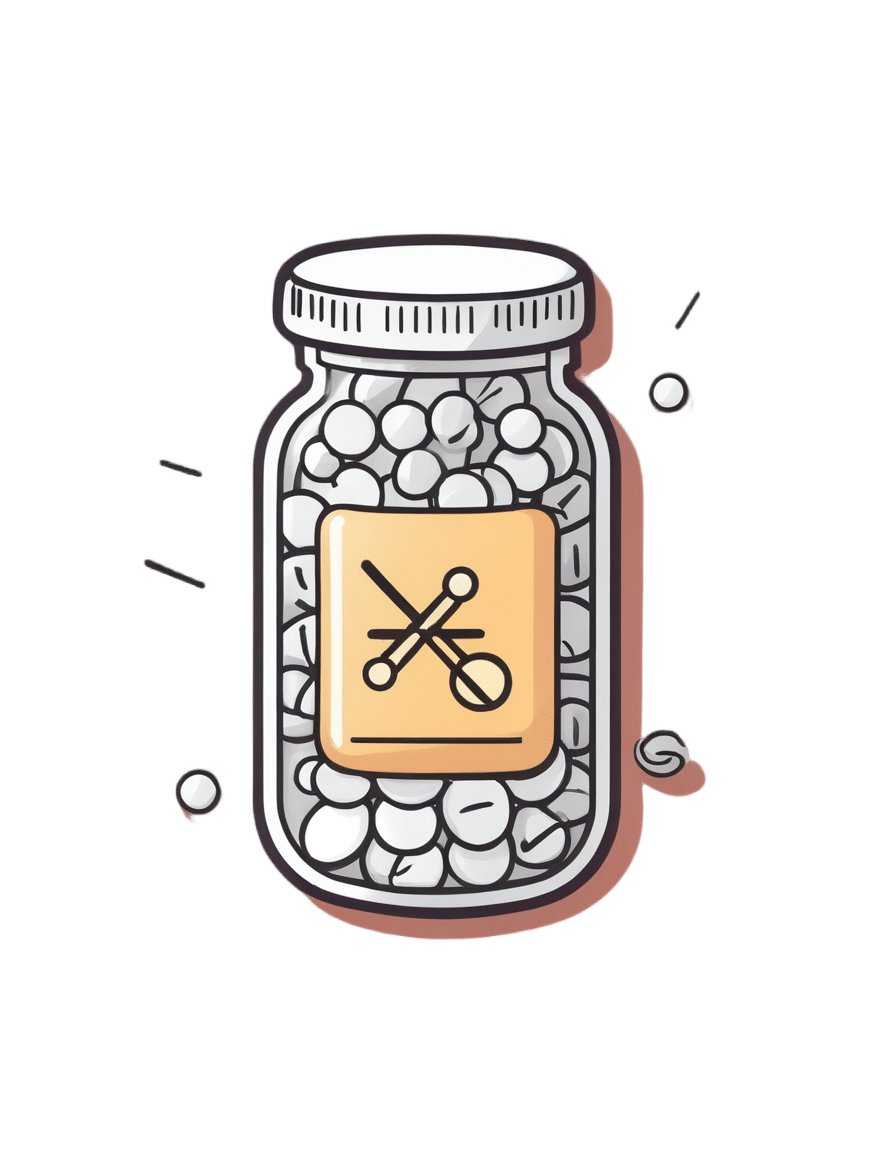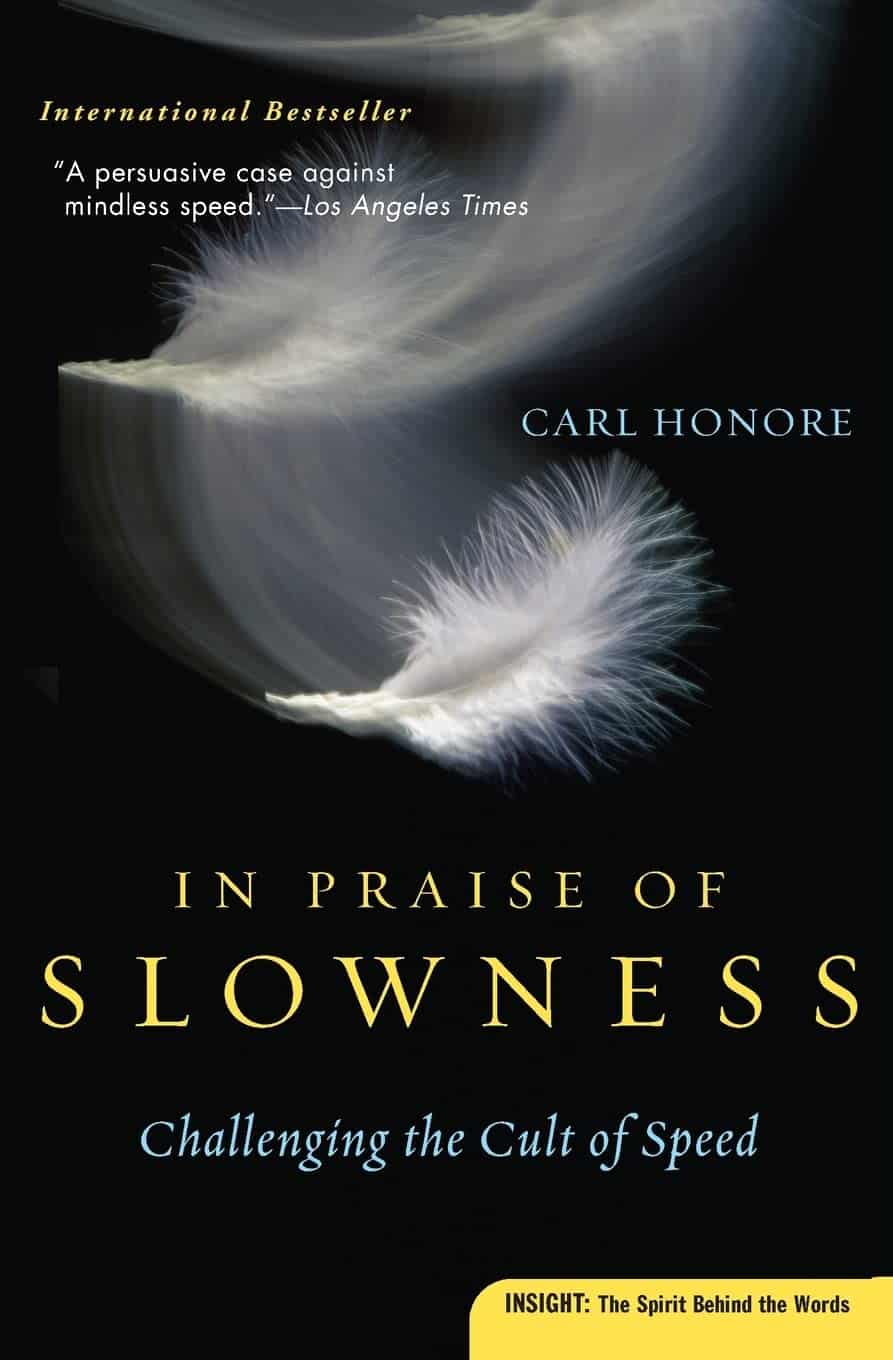
In Praise of Slowness – by Carl Honoré
10almonds is reader-supported. We may, at no cost to you, receive a portion of sales if you purchase a product through a link in this article.
This isn’t just about “taking the time to smell the roses” although yes, that too. Rather, it’s mostly about looking at what drives us to speed everything up in the first place, and correcting where appropriate.
If your ancestors had time to eat fruit and lie in the sun, then why, with all of modern technology now available, are you harangued 16+ hours a day by the pressures of universally synchronized timepieces?
Honoré places a lot of the blame squarely on the industrial revolution; whereas previously our work would be limited by craftsmen who take a year to complete something, or the pace of animals in a field, now humans had to keep up with the very machines that were supposed to serve us—and it’s only got worse from there.
This book takes a tour of many areas affected by this artificial “need for speed”, and how it harms not just our work-life balance, but also our eating habits, the medical attention we get, and even our love lives.
The prescription is deceptively simple, “slow down”. But Honoré dedicates the final three chapters of the book to the “how” of this, when of course there’s a lot the outside world will not accommodate—but where we can slow down, there’s good to be gained.
Bottom line: if you’ve ever felt that you could get all of your life into order if you could just pause the outside world for a week or two, this is the book for you.
Click here to check out In Praise of Slowness, and make time for what matters most!
Don’t Forget…
Did you arrive here from our newsletter? Don’t forget to return to the email to continue learning!
Recommended
Learn to Age Gracefully
Join the 98k+ American women taking control of their health & aging with our 100% free (and fun!) daily emails:
-
Eating on the Wild Side: – by Jo Robinson
10almonds is reader-supported. We may, at no cost to you, receive a portion of sales if you purchase a product through a link in this article.
The author is an investigative journalist, and it shows here, as she leaves no stone unturned in her quest for the truth in the face of many food myths.
She covers a lot of “popular wisdom” things that are varyingly true or false, or sometimes even both—in the case of food lore that’s a good rule of thumb, but has notable exceptions (e.g. “more colorful and/or darker-colored fruits/vegetables contain more nutrients”, which is a very good rule of thumb until one meets a cauliflower, for example).
She also covers food preparation myths, and how, to give one example, in spite of the popularity of “less cooked is better”, in some cases certain cooking methods will indeed destroy nutrients; in others, certain cooking methods will improve nutritional availability. Either by destroying an adjacent antinutrient (e.g. phytates), or by breaking something down into a more manageable form that our body can absorb. Knowing which is which, is important.
The book is organized by kinds of food, and does exclusively cover plants, but there’s more than enough material for any omnivore to enjoy.
The style is… Journalistic, it would be fair to say. Which is not surprising, given the author. But it means that it is written in a fairly narrative way, to draw the reader in and make it an enjoyable read while still being informative in all parts (there is no padding). In terms of science, the in-the-prose science is as minimal as possible to still convey what needs to be conveyed, while 25 pages of bibliography stack up at the end to show that indeed, this journalist cites sources.
Bottom line: this is a really enjoyable book, packed with a wealth of knowledge, and is perfect to uplift your cooking by knowing your ingredients a little more intimately!
Click here to check out Eating On The Wild Side, and, enjoy!
Share This Post
-
Terminal lucidity: why do loved ones with dementia sometimes ‘come back’ before death?
10almonds is reader-supported. We may, at no cost to you, receive a portion of sales if you purchase a product through a link in this article.
Dementia is often described as “the long goodbye”. Although the person is still alive, dementia slowly and irreversibly chips away at their memories and the qualities that make someone “them”.
Dementia eventually takes away the person’s ability to communicate, eat and drink on their own, understand where they are, and recognise family members.
Since as early as the 19th century, stories from loved ones, caregivers and health-care workers have described some people with dementia suddenly becoming lucid. They have described the person engaging in meaningful conversation, sharing memories that were assumed to have been lost, making jokes, and even requesting meals.
It is estimated 43% of people who experience this brief lucidity die within 24 hours, and 84% within a week.
Why does this happen?
Terminal lucidity or paradoxical lucidity?
In 2009, researchers Michael Nahm and Bruce Greyson coined the term “terminal lucidity”, since these lucid episodes often occurred shortly before death.
But not all lucid episodes indicate death is imminent. One study found many people with advanced dementia will show brief glimmers of their old selves more than six months before death.
Lucidity has also been reported in other conditions that affect the brain or thinking skills, such as meningitis, schizophrenia, and in people with brain tumours or who have sustained a brain injury.
Moments of lucidity that do not necessarily indicate death are sometimes called paradoxical lucidity. It is considered paradoxical as it defies the expected course of neurodegenerative diseases such as dementia.
But it’s important to note these episodes of lucidity are temporary and sadly do not represent a reversal of neurodegenerative disease.
Sadly, these episodes of lucidity are only temporary. Pexels/Kampus Production Why does terminal lucidity happen?
Scientists have struggled to explain why terminal lucidity happens. Some episodes of lucidity have been reported to occur in the presence of loved ones. Others have reported that music can sometimes improve lucidity. But many episodes of lucidity do not have a distinct trigger.
A research team from New York University speculated that changes in brain activity before death may cause terminal lucidity. But this doesn’t fully explain why people suddenly recover abilities that were assumed to be lost.
Paradoxical and terminal lucidity are also very difficult to study. Not everyone with advanced dementia will experience episodes of lucidity before death. Lucid episodes are also unpredictable and typically occur without a particular trigger.
And as terminal lucidity can be a joyous time for those who witness the episode, it would be unethical for scientists to use that time to conduct their research. At the time of death, it’s also difficult for scientists to interview caregivers about any lucid moments that may have occurred.
Explanations for terminal lucidity extend beyond science. These moments of mental clarity may be a way for the dying person to say final goodbyes, gain closure before death, and reconnect with family and friends. Some believe episodes of terminal lucidity are representative of the person connecting with an afterlife.
Why is it important to know about terminal lucidity?
People can have a variety of reactions to seeing terminal lucidity in a person with advanced dementia. While some will experience it as being peaceful and bittersweet, others may find it deeply confusing and upsetting. There may also be an urge to modify care plans and request lifesaving measures for the dying person.
Being aware of terminal lucidity can help loved ones understand it is part of the dying process, acknowledge the person with dementia will not recover, and allow them to make the most of the time they have with the lucid person.
For those who witness it, terminal lucidity can be a final, precious opportunity to reconnect with the person that existed before dementia took hold and the “long goodbye” began.
Yen Ying Lim, Associate Professor, Turner Institute for Brain and Mental Health, Monash University and Diny Thomson, PhD (Clinical Neuropsychology) Candidate and Provisional Psychologist, Monash University
This article is republished from The Conversation under a Creative Commons license. Read the original article.
Share This Post
-
A Guide to Rational Living – by Drs. Albert Ellis and Robert Harper
10almonds is reader-supported. We may, at no cost to you, receive a portion of sales if you purchase a product through a link in this article.
We’ve talked before about the evidence-based benefits of Cognitive Behavioral Therapy (CBT), and this book is indeed about CBT. In fact, it’s in many ways the book that popularized Third Wave CBT—in other words, CBT in its modern form.
Dr. Ellis’s specific branch of CBT is Rational Emotive Behavior Therapy, (REBT). What this means is using rationality to rewire emotions so that we’re not constantly sabotaging ourselves and our lives.
This is very much a “for the masses” book and doesn’t assume any prior knowledge of psychology, therapy, or psychotherapy. Or, for that matter, philosophy, since Stoic philosopher Epictetus had a lot to say that influenced Dr. Ellis’s work, too!
This book has also been described as “a self-help book for people who don’t like self-help books”… and certainly that Stoicism we mentioned does give the work a very different feel than a lot of books on the market.
The authors kick off with an initial chapter “How far can you go with self-therapy?”, and the answer is: quite far, even if it’s not a panacea. Everything has its limitations, and this book is no exception. On the other hand…
What the book does offer is a whole stack of tools, resources, and “How to…” chapters. In fact, there are so many “How to…” items in this book that, while it can be read cover-to-cover, it can also be used simply as a dip-in reference guide to refer to in times of need.
Bottom line: this book is highly recommendable to anyone and everyone, and if you don’t have it on your bookshelf, you should.
Click here to check out “A Guide To Rational Living” on Amazon today!
Share This Post
Related Posts
-
Neurotransmitter Cheatsheet
10almonds is reader-supported. We may, at no cost to you, receive a portion of sales if you purchase a product through a link in this article.
Which Neurotransmitter?
There are a lot of neurotransmitters that are important for good mental health (and, by way of knock-on effects, physical health).
However, when pop-science headlines refer to them as “feel-good chemicals” (yes but which one?!) or “the love molecule” (yes but which one?!) or other such vague names when referring to a specific neurotransmitter, it’s easy to get them mixed up.
So today we’re going to do a little disambiguation of some of the main mood-related neurotransmitters (there are many more, but we only have so much room), and what things we can do to help manage them.
Dopamine
This one predominantly regulates reward responses, though it’s also necessary for critical path analysis (e.g. planning), language faculties, and motor functions. It makes us feel happy, motivated, and awake.
To have more:
- eat foods that are rich in dopamine or its precursors such as tyrosine (bananas and almonds are great)
- do things that you find rewarding
Downsides: is instrumental in most addictions, and also too much can result in psychosis. For most people, that level of “too much” isn’t obtainable due to the homeostatic system, however.
See also: Rebalancing Dopamine (Without “Dopamine Fasting”)
Serotonin
This one predominantly helps regulate our circadian rhythm. It also makes us feel happy, calm, and awake.
To have more:
- get more sunlight, or if the light must be artificial, then (ideally) full-spectrum light, or (if it’s what’s available) blue light
- spend time in nature; we are hardwired to feel happy in the environments in which we evolved, which for most of human history was large open grassy expanses with occasional trees (however, for modern purposes, a park or appropriate garden will suffice).
Downsides: this is what keeps us awake at night if we had too much light before bed, and also too much serotonin can result in (potentially fatal) serotonin syndrome. Most people can’t get that much serotonin due to our homeostatic system, but some drugs can force it upon us.
See also: Seasonal Affective Disorder Strategies
Oxytocin
This one predominantly helps us connect to others on an emotional level. It also makes us feel happy, calm, and relaxed.
To have more:
- hug a loved one (or even just think about doing so, if they’re not available)
- look at pictures/videos of cute puppies, kittens, and the like—this triggers a similar response
Downsides: negligible. Socially speaking, it can cause us to drop our guard, most for most people most of the time, this is not a problem. It can also reduce sexual desire—it’s in large part responsible for the peaceful lulled state post-orgasm. It’s not responsible for the sleepiness in men though; that’s mostly prolactin.
See also: Only One Kind Of Relationship Promotes Longevity This Much!
Adrenaline
This one predominantly affects our sympathetic nervous system; it elevates heart rate, blood pressure, and other similar functions. It makes us feel alert, ready for action, and energized.
To have more:
- listen to a “power anthem” piece of music. What it is can depend on your musical tastes; whatever gets you riled up in an empowering way.
- engage in something competitive that you feel strongly about while doing it—or by the same mechanism, a solitary activity where the stakes feel high even if it’s actually quite safe (e.g. watching a thriller or a horror movie, if that’s your thing).
Downsides: its effects are not sustainable, and (in cases of chronic stress) the body will try to sustain them anyway, which has a deleterious effect. Because adrenaline and cortisol are closely linked, chronically high adrenal action will tend to mean chronically high cortisol also.
See also: Lower Your Cortisol! (Here’s Why & How)
PS: it is also called epinephrine, and chemically different but almost identical in most ways, noradrenaline or norepinephrine
Some final words
You’ll notice that in none of the “how to have more” did we mention drugs. That’s because:
- a drug-free approach is generally the best thing to try first, at the very least
- there are simply a lot of drugs to affect each one (or more), and talking about them would require talking about each drug in some detail.
However, the following may be of interest for some readers:
Antidepressants: Personalization Is Key!
Take care!
Don’t Forget…
Did you arrive here from our newsletter? Don’t forget to return to the email to continue learning!
Learn to Age Gracefully
Join the 98k+ American women taking control of their health & aging with our 100% free (and fun!) daily emails:
-
Brazil Nuts vs Hazelnuts – Which is Healthier?
10almonds is reader-supported. We may, at no cost to you, receive a portion of sales if you purchase a product through a link in this article.
Our Verdict
When comparing Brazil nuts to hazelnuts, we picked the hazelnuts.
Why?
In terms of macros, Brazil nuts have more fats (including more omega-3, and/but also including more saturated fat) while hazelnuts have more fiber, carbs, and protein. So, which one wins this round is a little subjective; we’d say it’s the fiber for hazelnuts that cinch it, but we could also reasonably declare this round a tie.
In the category of vitamins, Brazil nuts are not higher in any vitamins, while hazelnuts are higher in vitamins A, B1, B2, B3, B5, B6, B7, B9, C, E, K, and choline. And the margins of difference are large in most cases. An easy win for hazelnuts here.
When it comes to minerals, things get interesting: Brazil nuts have more calcium, magnesium, phosphorus, and selenium, while hazelnuts have more iron, manganese, and potassium, but!
Before we crown Brazil nuts with a 4:3 win in this category, though, let’s take a closer look at those selenium levels:
- A cup of hazelnuts contains 13% of the RDA of selenium. Your hair will be luscious and shiny.
- A cup of Brazil nuts contains 10,456% of the RDA of selenium. This is way past the point of selenium toxicity, and your (luscious, shiny) hair will fall out.
For this reason, it’s recommended to eat no more than 3–4 Brazil nuts per day.
We consider that a point against Brazil nuts.
Adding up the sections makes for an overall win for hazelnuts, but by all means enjoy either or both, we just recommend to practise moderation when it comes to the Brazil nuts!
Want to learn more?
You might like:
Why You Should Diversify Your Nuts
Enjoy!
Don’t Forget…
Did you arrive here from our newsletter? Don’t forget to return to the email to continue learning!
Learn to Age Gracefully
Join the 98k+ American women taking control of their health & aging with our 100% free (and fun!) daily emails:
-
How Does One Test Acupuncture Against Placebo Anyway?
10almonds is reader-supported. We may, at no cost to you, receive a portion of sales if you purchase a product through a link in this article.
Pinpointing The Usefulness Of Acupuncture
We asked you for your opinions on acupuncture, and got the above-depicted, below-described, set of answers:
- A little under half of all respondents voted for “It’s well-backed by modern science, per neurology, cardiology, immunology, etc”
- Slightly fewer respondents voted for “We don’t understand how it works, but it works!”
- A little under a fifth of respondents voted for “It may have some limited clinical applications beyond placebo”
- One (1) respondent voted for for “It’s placebo at best”
When we did a main feature about homeopathy, a couple of subscribers wrote to say that they were confused as to what homeopathy was, so this time, we’ll start with a quick definition first.
First, what is acupuncture? For the convenience of a quick definition so that we can move on to the science, let’s borrow from Wikipedia:
❝Acupuncture is a form of alternative medicine and a component of traditional Chinese medicine in which thin needles are inserted into the body.
Acupuncture is a pseudoscience; the theories and practices of TCM are not based on scientific knowledge, and it has been characterized as quackery.❞
Now, that’s not a promising start, but we will not be deterred! We will instead examine the science itself, rather than relying on tertiary sources like Wikipedia.
It’s worth noting before we move on, however, that there is vigorous debate behind the scenes of that article. The gist of the argument is:
- On one side: “Acupuncture is not pseudoscience/quackery! This has long been disproved and there are peer-reviewed research papers on the subject.”
- On the other: “Yes, but only in disreputable quack journals created specifically for that purpose”
The latter counterclaim is a) potentially a “no true Scotsman” rhetorical ploy b) potentially true regardless
Some counterclaims exhibit specific sinophobia, per “if the source is Chinese, don’t believe it”. That’s not helpful either.
Well, the waters sure are muddy. Where to begin? Let’s start with a relatively easy one:
It may have some clinical applications beyond placebo: True or False?
True! Admittedly, “may” is doing some of the heavy lifting here, but we’ll take what we can get to get us going.
One of the least controversial uses of acupuncture is to alleviate chronic pain. Dr. Vickers et al, in a study published under the auspices of JAMA (a very respectable journal, and based in the US, not China), found:
❝Acupuncture is effective for the treatment of chronic pain and is therefore a reasonable referral option. Significant differences between true and sham acupuncture indicate that acupuncture is more than a placebo.
However, these differences are relatively modest, suggesting that factors in addition to the specific effects of needling are important contributors to the therapeutic effects of acupuncture❞
Source: Acupuncture for Chronic Pain: Individual Patient Data Meta-analysis
If you’re feeling sharp today, you may be wondering how the differences are described as “significant” and “relatively modest” in the same text. That’s because these words have different meanings in academic literature:
- Significant = p<0.05, where p is the probability of the achieved results occurring randomly
- Modest = the differences between the test group and the control group were small
In other words, “significant modest differences” means “the sample sizes were large, and the test group reliably got slightly better results than placebo”
We don’t understand how it works, but it works: True or False
Broadly False. When it works, we generally have an idea how.
Placebo is, of course, the main explanation. And even in examples such as the above, how is placebo acupuncture given?
By inserting acupuncture needles off-target rather than in accord with established meridians and points (the lines and dots that, per Traditional Chinese Medicine, indicate the flow of qi, our body’s vital energy, and welling-points of such).
So, if a patient feels that needles are being inserted randomly, they may no longer have the same confidence that they aren’t in the control group receiving placebo, which could explain the “modest” difference, without there being anything “to” acupuncture beyond placebo. After all, placebo works less well if you believe you are only receiving placebo!
Indeed, a (Korean, for the record) group of researchers wrote about this—and how this confounding factor cuts both ways:
❝Given the current research evidence that sham acupuncture can exert not only the originally expected non-specific effects but also sham acupuncture-specific effects, it would be misleading to simply regard sham acupuncture as the same as placebo.
Therefore, researchers should be cautious when using the term sham acupuncture in clinical investigations.❞
Source: Sham Acupuncture Is Not Just a Placebo
It’s well-backed by modern science, per neurology, cardiology, immunology, etc: True or False?
False, for the most part.
While yes, the meridians and points of acupuncture charts broadly correspond to nerves and vasculature, there is no evidence that inserting needles into those points does anything for one’s qi, itself a concept that has not made it into Western science—as a unified concept, anyway…
Note that our bodies are indeed full of energy. Electrical energy in our nerves, chemical energy in every living cell, kinetic energy in all our moving parts. Even, to stretch the point a bit, gravitational potential energy based on our mass.
All of these things could broadly be described as qi, if we so wish. Indeed, the ki in the Japanese martial art of aikido is the latter kinds; kinetic energy and gravitational potential energy based on our mass. Same goes, therefore for the ki in kiatsu, a kind of Japanese massage, while the ki in reiki, a Japanese spiritual healing practice, is rather more mystical.
The qi in Chinese qigong is mostly about oxygen, thus indirectly chemical energy, and the electrical energy of the nerves that are receiving oxygenated blood at higher or lower levels.
On the other hand, the efficacy of the use of acupuncture for various kinds of pain is well-enough evidenced. Indeed, even the UK’s famously thrifty NHS (that certainly would not spend money on something it did not find to work) offers it as a complementary therapy for some kinds of pain:
❝Western medical acupuncture (dry needling) is the use of acupuncture following a medical diagnosis. It involves stimulating sensory nerves under the skin and in the muscles.
This results in the body producing natural substances, such as pain-relieving endorphins. It’s likely that these naturally released substances are responsible for the beneficial effects experienced with acupuncture.❞
Source: NHS | Acupuncture
Meanwhile, the NIH’s National Cancer Institute recommends it… But not as a cancer treatment.
Rather, they recommend it as a complementary therapy for pain management, and also against nausea, for which there is also evidence that it can help.
Frustratingly, while they mention that there is lots of evidence for this, they don’t actually link the studies they’re citing, or give enough information to find them. Instead, they say things like “seven randomized clinical trials found that…” and provide links that look reassuring until one finds, upon clicking on them, that it’s just a link to the definition of “randomized clinical trial”:
Source: NIH | Nactional Cancer Institute | Acupuncture (PDQ®)–Patient Version
However, doing our own searches finds many studies (mostly in specialized, potentially biased, journals such as the Journal of Acupuncture and Meridian Studies) finding significant modest outperformance of [what passes for] placebo.
Sometimes, the existence of papers with promising titles, and statements of how acupuncture might work for things other than relief of pain and nausea, hides the fact that the papers themselves do not, in fact, contain any evidence to support the hypothesis. Here’s an example:
❝The underlying mechanisms behind the benefits of acupuncture may be linked with the regulation of the hypothalamic-pituitary-gonadal (adrenal) axis and activation of the Wnt/β-catenin and OPG/RANKL/RANK signaling pathways.
In summary, strong evidence may still come from prospective and well-designed clinical trials to shed light on the potential role of acupuncture in preserving bone loss❞
Source: Acupuncture for Osteoporosis: a Review of Its Clinical and Preclinical Studies
So, here they offered a very sciencey hypothesis, and to support that hypothesis, “strong evidence may still come”.
“We must keep faith” is not usually considered evidence worthy of inclusion in a paper!
PS: the above link is just to the abstract, because the “Full Text” link offered in that abstract leads to a completely unrelated article about HIV/AIDS-related cryptococcosis, in a completely different journal, nothing to do with acupuncture or osteoporosis).
Again, this is not the kind of professionalism we expect from peer-reviewed academic journals.
Bottom line:
Acupuncture reliably performs slightly better than sham acupuncture for the management of pain, and may also help against nausea.
Beyond placebo and the stimulation of endorphin release, there is no consistently reliable evidence that is has any other discernible medical effect by any mechanism known to Western science—though there are plenty of hypotheses.
That said, absence of evidence is not evidence of absence, and the logistical difficulty of testing acupuncture against placebo makes for slow research. Maybe one day we’ll know more.
For now:
- If you find it helps you: great! Enjoy
- If you think it might help you: try it! By a licensed professional with a good reputation, please.
- If you are not inclined to having needles put in you unnecessarily: skip it! Extant science suggests that at worst, you’ll be missing out on slight relief of pain/nausea.
Take care!
Don’t Forget…
Did you arrive here from our newsletter? Don’t forget to return to the email to continue learning!
Learn to Age Gracefully
Join the 98k+ American women taking control of their health & aging with our 100% free (and fun!) daily emails:

